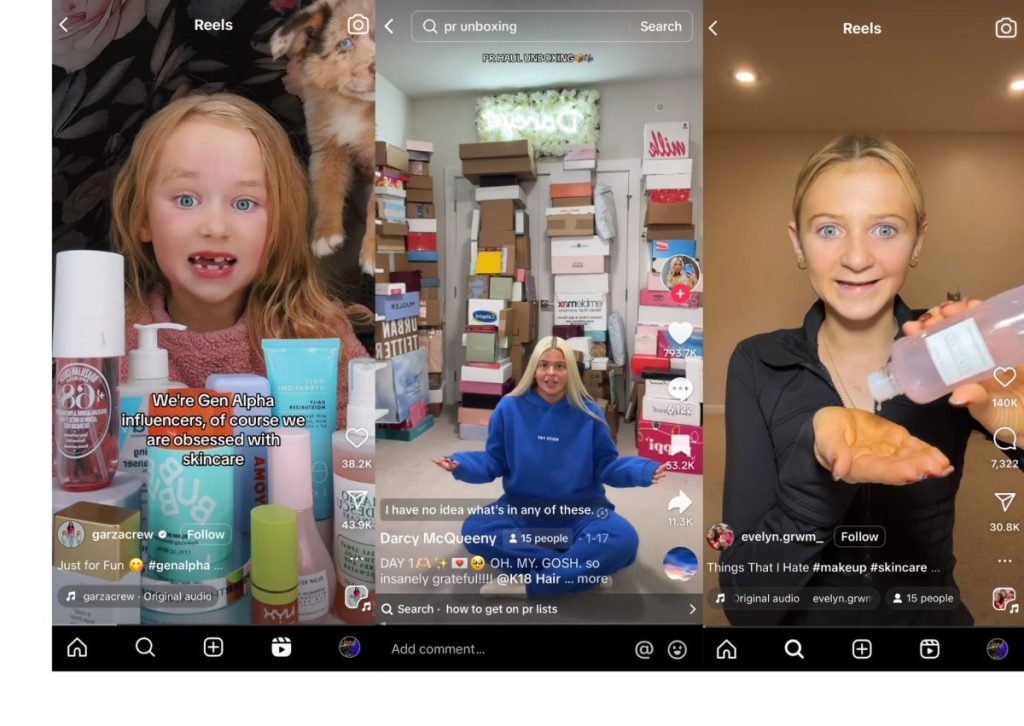As adults, we often reminisce about childhood and tell kids to enjoy their youth, cautioning them not to rush into adulthood. “Don’t grow up too fast,” we say. Yet, when we were young, we longed to be grown-ups ourselves. Today, that desire seems more pronounced among children, particularly with the rise of social media. We now see kids as young as 10 looking far older than we did, a phenomenon dubbed “Sephora Kids”—young preteens who embrace makeup and beauty culture influenced by social media.
But is this trend harmful, or are these kids simply having fun with makeup?
The Influence of Social Media
Social media has transformed how children perceive beauty and self-presentation. Platforms like TikTok are filled with beauty influencers posting makeup tutorials, skincare routines, and fashion trends. Many influencers are just a few years older than their young fans, creating relatable yet role models. This environment encourages preteens to see makeup and beauty products not just as adult stuff, but as essential tools for self-expression.
Playing with Makeup or Emulating Adulthood?
Experimenting with makeup can be harmless fun. For many kids, playing with lip gloss and eyeshadow is akin to dressing up. It allows for creativity and self-exploration, serving as a form of art that enables children to express their personalities.
However, there’s a difference between innocent play and feeling forced to adopt adult behaviors. Concerns arise when children believe they need makeup to be attractive or fit in. When makeup is a tool for self-expression, it can empower. But when it becomes something they feel pressured to keep up with trends, it can negatively affect their self-esteem.
It’s also very bad for their skin. Young children don’t need all those skincare, it can even give them unnecessary damage such as rashes, allergic reactions and even skin burns.

The Pressure of Perfection
The downside of the “Sephora Kids” trend is the pressure of society to meet unrealistic beauty ideals. Social media is filled with filtered images, creating an environment where children are overwhelmed with airbrushed perfection. When they see influencers or people from their own age posting flawless looks, it can lead to feelings of insecurity.
Children are especially vulnerable to these pressures as they develop their identities. Emulating adult looks may also result in being treated as older than they are, leading to inappropriate situations or social pressures.
A good example of this is this Dutch influencer named Jade Anna. A lot of younger kids look up to her and her glamorous lifestyle. A few weeks ago she got a breast augmentation. I am a firm believer that she can do whatever she wants with her body if she feels good about it, but she does have a sort of function as a role model. This influencer is only 20 years old and probably making a lot of younger girls insecure about their breasts.
Finding Balance
The key lies in balance. Makeup itself isn’t harmful; it can be fun, like drawing on your face!. However, parents and guardians should have conversations about makeup’s role in their children’s lives. Encouraging kids to enjoy their childhood and feel confident in their natural look is important.
Parents should also monitor the content their children consume and set limits when necessary. Fostering a healthy relationship with beauty, where makeup is viewed as fun rather than essential, can help mitigate the negative effects of social media.
Conclusion
The rise of the “Sephora Kids” phenomenon highlights the significant impact social media has on younger generations. While makeup can be a fun way to express oneself, it’s crucial to prevent children from feeling pressured to grow up too fast or meet unrealistic beauty standards. With proper guidance, kids can enjoy beauty and social media in a healthy way, fostering creativity without sacrificing the joy of childhood. I’m mostly surprised how these kids can afford all that makeup.



Personally, I haven’t heard much about this phenomenon and make-up is a topic I don’t deal with much. Nevertheless, or perhaps precisely because of this, I found the blog very interesting. I mean, I grew up very classically male. Not extremely toxic, but the subject of make-up probably never interested me because I had no contact with it from my male environment. I would therefore be very interested to know whether this phenomenon only applies to girls or whether it perhaps also has an effect on boys who come into contact with it in this way, and whether it somewhat weakens a toxic male rejection without questioning it
I find the subject to be very interesting, and I’ve been observing this phenomenon online for a while now. I remember when I was a child, makeup excited me, and I loved playing dress up with my sister using my mom’s cosmetics, so I think it partially comes from the need for creative expression. However, it is also true that nowadays, it might be more connected to the chase of beauty standards promoted online. Another thing that I believe might be a reason for the rise of this phenomenon is consumerism. It seems like many of those girls collect beauty products just for the sake of owning them, especially when it comes to skincare products that do not visibly alter your looks. Perhaps because the packaging looks aesthetically appealing, a popular TV series star released her new brand, or because their friends collect those products too. When I was a little girl, I was obsessed with collecting the littlest pet shop figures, and perhaps makeup and skincare became ‘cool’ to collect today.
I find this whole trend of young children being so focused on their appearance pretty scary, especially when I think about how much it has grown in recent years. It’s worrying that kids are already so obsessed with makeup and beauty culture at such a young age, and it makes me hope that kids today are more focused on being themselves and spending time playing outside than worrying about how they look. I get that once in a while, playing with a bit of lipstick or experimenting with makeup can be fun, but the pressure kids are facing to look like adults is a whole different level. Social media has made this even worse, with influencers showing these perfect, airbrushed images that can really mess with a kid’s self-esteem. I also worry about the impact on their skin and health—too much skincare and makeup at such a young age can lead to rashes, allergies, and even burns. Plus, it’s concerning when they look up to influencers who might not fully understand the responsibility they have as role models. Take someone like Kylie Jenner, for example, who is known for promoting beauty products and cosmetic enhancements. While she has the right to do whatever she wants with her body, her influence on young girls can make them feel pressured to look a certain way, even when they’re not yet old enough to fully understand the consequences. I just wish that kids could focus more on having fun and being themselves rather than feeling the need to fit into such unrealistic beauty standards. and its as u said all about balance!
This is a very interesting read, I have observed a similar phenomenon in different ways. As a fan of Hip Hop music and culture, I have recently seen a rise in very young, usually white, sub-urban rappers that have grown up with social media. This has allowed what was once music targetted for specific people and lived experiences to be available to different people from a very young age. Although I do not believe this is a necesarily bad thing, I do worry about the affects it has had. Many young rappers with no ties to gang violence often use the same motifs, rap about the same stories that other rappers that actually lived these moments do. This come from the same place, kids wanting to be adults without a proper understanding of what an adult is and about what lives people can lead.